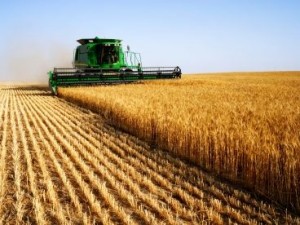Sep 17 2018
Intense Farming Better Than Organic
 A new study reviews hundreds of articles on several farming systems (dairy, beef, wheat, and rice) to compare different approaches to farming and their net effect on the environment. They conclude that intensive farming systems are the “least bad” option for providing the food we need. This is in line with previous studies showing that organic farming uses significantly more land than conventional farming.
A new study reviews hundreds of articles on several farming systems (dairy, beef, wheat, and rice) to compare different approaches to farming and their net effect on the environment. They conclude that intensive farming systems are the “least bad” option for providing the food we need. This is in line with previous studies showing that organic farming uses significantly more land than conventional farming.
Farming has a huge negative impact on the environment. There is no way around that basic fact – farmland displaces natural ecosystems and has significant externalities, such as water use, release of CO2 from the soil, and runoff of chemicals into the environment. Right now we are using 11% of all land on Earth for farming, which is most of the land that is reasonably suitable for farming. To meet the needs of a growing population, we may need to expand farmland, into less and less productive land, which would significantly increase the negative impact of farming on the environment.
Some previous studies compared different farming systems by measuring the impact they have on the land. But this type of analysis is misleading – the authors of the current study instead looked at the environmental impact for a given production of food. That is what really matters. They also looked at studies that measured externalities, as listed above. They found:
Their results from four major agricultural sectors suggest that, contrary to many people’s perceptions, more intensive agriculture that uses less land may also produce fewer pollutants, cause less soil loss and consume less water.
They found that organic dairy farming uses twice as much land as conventional farming, for example.
The study is a blow to the propaganda of the organic lobby, who base their methods on the appeal to nature fallacy, rather than the best scientific evidence. Their response to this study was a typical non sequitur:
Organic group though are not impressed with the study’s conclusions. They argue that the world produces enough food already and that the issues with feeding populations are economic and political, not agricultural.
First, no we don’t. We do not produce enough food to give every person on Earth the minimum nutrition as indicated by the USDA. These recommendations, by the way, are not for an overfed Western diet. Developed countries would generally decrease their land use if they adopted USDA recommendations. But the rest of the world would dramatically increase their land use, in an unsustainable way.
Organic apologists often argue that we produce more calories than we need to feed the world. This is one of those “true but misleading” statements. You cannot just consider calories. Most calories produced and consumed are staples, mostly grains like rice, wheat, and corn. These are great sources of calories, but not balanced nutrition. Keeping everyone well fed requires more than calories – it requires a diversity of food with lots of vegetables and sufficient protein.
Further, the assumption that we produce enough food is based on zero waste, which is ridiculously unrealistic. Sure, we can reduce waste in the food system, and we should strive to make the system as efficient as possible. But food spoils and is vulnerable to pests. You cannot eliminate waste entirely.
So – even if we reasonably reduced food waste and optimized economic and political distribution of food – we would not produce enough food to adequately feed the world.
Further, even if true, this point is irrelevant. It misses the fact that we already are using a massive amount of land for farming, with massive impacts on the environment. We should be striving to minimize our agricultural footprint, and that means getting the most food out of every acre we farm.
And finally, the human population is growing. We will likely hit 9 billion people by 2050. It is not clear where the population will top out, but it will be more than the current population. We don’t have more viable land to expand farming into, and we don’t want to. We want to reduce our land use, not increase it.
Whenever I bring up this point someone whines incoherently that I am wrong to talk about producing more food than reducing the human population. Of course, I advocate addressing poverty and women’s rights, which correlate with reduced population growth. This is a win-win, increase quality of life and stabilize the population. But nothing we do is going to prevent the population from rising over the next 50 years, unless it is your intent to deliberately cause mass starvation as a way of limiting our environmental impact.
And again – at any human population, we should strive to minimize the environmental impact of farming. That means looking at the evidence objectively (not through ideological filters). We need to produce the most amount of food on the land we are using, minimize externalities, minimize waste, and optimize distribution. There is no false choice among these options – we should do it all.
We should also use every technology at our disposal to accomplish these ends. That includes biotechnology, such as various types of genetically modified organisms. The anti-GMO movement is based entirely on propaganda and pseudoscience, and is harmful to the environment.
We also need to do more research into these very questions, as the authors acknowledge. But the evidence we have is very clear – organic and other ideologically based farming practices are harmful to the environment. We should use whatever techniques the evidence says are best, and not artificially limit our choices in an unsustainable way.






